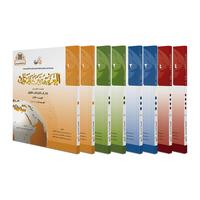٢٫٣٫٣٠ - الحياة الزوجية - من هي؟
life|marital life|"Who is"|who is
2.3.30 - Eheleben - wer ist das?
2.3.30 - married life - who is it?
2.3.30 - vida matrimonial - ¿quién es?
2.3.30 - Vie conjugale - Qui est-elle ?
2.3.30 - vita coniugale - chi è?
2.3.30 - życie małżeńskie - kto to jest?
2.3.30 - vida conjugal - quem é?
2.3.30 - семейная жизнь - кто это?
2.3.30 - Giftermål - Vem är hon?
2.3.30 - Evlilik hayatı - O kim?
2.3.30 - 婚姻生活 - 她是谁?
أحمد: من؟!
Ahmad|who
|kto
Ahmad: Von wem?!
Ahmed: Who?!
Ahmed : Qui ?!
صديقي عبد الله!
my friend|my friend|God
mój przyjaciel||
Mein Freund Abdullah!
My friend Abdullah!
Mon ami Abdallah !
Min vän Abdullah!
عبد الله: نعم، أهلا يا أحمد.
servant|God|Yes|||Ahmad
|||cześć||
Abdullah: Ja, Hallo Ahmad.
Abdullah: Yes, welcome Ahmed.
阿卜杜拉:是的,欢迎,艾哈迈德。
كيف حالك؟
how are|you
|się masz
Wie geht es dir?
How are you?
أحمد: الحمد لله، أنا بخير.
Ahmed|praise|to God|I am|fine good
Ahmad: Alhamdulillah, mir geht es gut.
Ahmed: Thank God, I'm fine.
أين أنت؟ ما رأيتك منذ تركنا الدراسة في جامعة، قبل خمس سنوات.
||was|ich habe dich gesehen||verlassen||||||
Where are you?|you|I|I saw you|since|left|studies|at|University (1)|ago|five|five years
|||görmedim||bıraktık||||||
|||t'ai vu||||||||
gdzie|||cię widziałem|od|opuściliśmy|studia||||pięć|lat
Wo bist du? Ich habe dich seit unserem Studium an der Universität nicht mehr gesehen, vor fünf Jahren.
Where are you? I haven't seen you since we dropped out of college, five years ago.
Var är du? Jag har inte sett dig sedan vi slutade på universitetet, för fem år sedan.
你在哪里?自从五年前我们离开大学以来,我就没有见过你。
عبد الله: بعد الدراسة، عملت مدرسا في مدينتي.
||||worked|||meiner Stadt
servant of|God|after|the study|worked as|as a teacher|in my|my hometown
|||||||şehrimde
|||szkole|pracowałem|nauczycielem||moim mieście
Abdullah: Nach dem Studium habe ich als Lehrer in meiner Stadt gearbeitet.
Abdullah: After school, I worked as a teacher in my city.
Abdullah: Efter att ha studerat arbetade jag som lärare i min stad.
阿卜杜拉:学习后,我在我的城市当了一名教师。
أحمد: وماذا فعلت يا عبد الله؟
Ahmad|and what|you do|oh|servant of|O God
|a co|zrobiłeś|||
Ahmad: Und was hast du getan, Abdullah?
Ahmed: And what did you do, Abdullah?
Ahmed: Vad gjorde du, Abdullah?
艾哈迈德:阿卜杜拉,你做了什么?
عبد الله: تزوجت، والحمد لله، ولي ابن و بنت.
||s'est marié||||||
servant of|God|I got married|and praise|to God|I have|son|and one|daughter
||evlendi||||||
||I got married|i dziękuję||mam|syn son||córka
||heiratet||||||
Abdullah: Ich habe geheiratet, und dank Allah, habe ich einen Sohn und eine Tochter.
Abdullah: I got married, thank God, and I have a son and a daughter.
阿卜杜拉:感谢上帝,我结婚了,并育有一儿一女。
أحمد: أنا لم أتزوج حتى الآن، لم أجد الفتاة المناسبة.
|||evlenmek||||||
|||me suis marié||||||
Ahmed|I|not|I have married|until now|yet|not|find|the right girl|right one
|||he marry||||||
||nie|ożeniłem się|jeszcze|jeszcze nie|nie|znalazłem|dziewczyny|odpowiednia
Ahmed: Ich bin immer noch nicht verheiratet, ich habe das richtige Mädchen noch nicht gefunden.
Ahmed: I'm not married yet, I haven't found the right girl.
Ahmed : Je ne me suis pas encore marié, je n'ai pas trouvé la bonne fille.
عبد الله: لدي فتاة مناسبات لك، وهي ذات خلق ودين، وتعمل مدرسة.
|||Mädchen|||||Charakter Benehmen|Glauben|arbeitet als|
servant of||"I have"|a girl|suitable occasions|for you|she is|of good character|morals and religion|Good character and faith|"works as"|teacher
|||kız|||||||çalışıyor|
||||||||caractère|et de la religion||
||mam|dziewczyna||dla ciebie|ona jest|o wysokich wartościa|obyczajach|religia|pracuje jako|nauczycielka
Abdullah: Ich habe ein passendes Mädchen für dich, sie hat gute Manieren und ist religiös, sie arbeitet als Lehrerin.
Abdullah: She has a suitable girl for you, she is of good character and religion, and she works as a teacher.
Abdullah : J'ai une fille qui vous convient. Elle est de caractère religieux et travaille comme enseignante.
Abdullah: Dia memiliki seorang gadis yang cocok untukmu, dan dia berakhlak dan beragama yang baik, dan dia bekerja sebagai guru.
Abdullah: Ze heeft een meisje dat bij je past, ze is goedaardig en religieus, en ze werkt als lerares.
阿卜杜拉:我有一个适合你的女孩,她有宗教信仰,是一名教师。
أحمد: من هي؟
Ahmed|who|she
Ahmed: Wer ist sie?
Ahmed: Who is she?
艾哈迈德:她是谁?
عبد الله: أختي ليلى.
|||Leila
|||Layla
Servant of|God|my sister|Leila
|||Leyla
||my sister|
Abdullah: Meine Schwester Leila.
Abdullah: My sister, Laila.
阿卜杜拉:我的妹妹莱拉。
أحمد: ليلى، سمعت أنها فتاة طيبة.
Ahmad|Layla|I heard|she|girl|kind
|Leyla||||
||słyszałem|ona|dziewczyna|
Ahmad: Leila, ich habe gehört, dass sie ein nettes Mädchen ist.
Ahmed: Layla, I heard she is a good girl.
艾哈迈德:莱拉,我听说她是个好女孩。
عبد الله: زرنا في بيتنا، وستجد ما تحب، بإذن الله.
||visited|||and you will find|||wenn Gott will|
servant of|God willing|visit us|in our|our house|you will find|what|like|God willing|God
||||||||izinle|
|||||tu trouveras|||si Dieu le veut|
||odwiedziliśmy||naszym domu|i znajdziesz|to co|lubisz|z Bożą wolą|
Abdullah: Besuche uns in unserem Haus, und du wirst finden, was du magst, InshaAllah.
Abdullah: Visit us in our house, and you will find what you like, God willing.
Abdullah : Visitez-nous chez nous et vous trouverez ce que vous aimez, si Dieu le veut.
Abdullah: Bezoek ons bij ons thuis en je zult vinden wat je leuk vindt, als God het wil.
阿卜杜拉:到我们家来看看吧,上帝保佑,你会找到你喜欢的东西。
أحمد: فكرة جيدة.
Ahmed|idea|good idea
|idea|
Ahmad: Gute Idee.
Ahmed: Good idea.
艾哈迈德:好主意。
سأزورك في الأسبوع القادم، إن شاء الله.
je te rendrai visite||||||
ich werde dich besuchen||||||
seni ziyaret edeceğim||||||
odwiedzę ci||tygodniu|przyszłym|||
I will visit|in|next week|the coming|if|God willing|God willing
Ich werde dich nächste Woche besuchen, so Gott will.
I will visit you next week, God willing.
如果上帝愿意,我下周会去看你。
عبد الله: مرحبا بك يا صديقي، و نحن في انتظارك.
|||||||||deiner ожидания
||||||et|||toi
servant of|God|Hello|"to you"|O|my friend|and|we are|in|your arrival
|||||||||bekliyoruz
||Witaj|ciebie||||jesteśmy||twoje przybycie
Abdullah: Willkommen, mein Freund, wir warten auf dich.
Abdullah: Welcome my friend, we are waiting for you.
阿卜杜拉:欢迎,我的朋友,我们在等你。
أحمد: إلى اللقاء.
Ahmad|to|See you.
||görüşürüz
||do widzenia
Ahmad: Auf Wiedersehen.
Ahmed: Bye.
艾哈迈德:再见。
عبد الله: في أمان الله.
|||sérénité|
servant of|God|in|safe keeping|God
|||Aman|
|||ochronie|
Abdullah: In the safety of God.
Abdullah : Dans la sécurité de Dieu.
阿卜杜拉:以上帝保佑。

